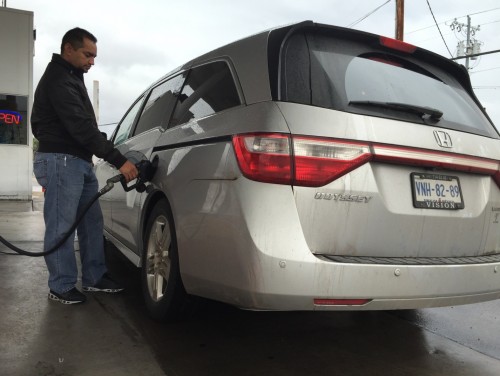
Nogales, Sonora — Victor Carrasco, a personal trainer from Nogales, Sonora, commutes to sister city Nogales, Arizona, to buy gasoline for his Chevrolet Silverado.
“The gasoline in Mexico is not good because it ruins cars,” Carrasco said. “I prefer American gasoline because of its quality and durability.”
Carrasco isn’t the only person from Mexico who takes the time to cross the border to gas up.
Carlos Ochoa, a gas station attendant at a PEMEX gas station in Sonora has had customers comment on Mexico’s low quality gasoline.
“Some say that the quality doesn’t last and that the price is too high,” Ochoa said. “We do sell gasoline cheaper here than in the southern parts of the country. Those who can cross to the United States prefer to pump gas over there.”
While the perception by some that U.S. gas is better quality might be good for U.S. stations, the belief is a myth, experts say.
Enrique Felix, president of ONEXPO Sonora, an organization for petroleum retailers in Mexico, said Mexico’s two types of gasoline, magna and premium, have similar octane levels as American gasoline.
“The Mexican premium gasoline contains 92 octanes of major quality, similar to the premium gasoline with the same octane levels as the United States,” Felix said.
He said PEMEX employs mobile laboratory vans to visit gas stations and plants every week to two weeks to monitor gas for climate-caused water residue, lead, low sulfur, and octane levels.
According to the International Fuel Quality Centers Fuel Specification Book, Mexico’s sulfur limit in premium fuel is a maximum of 80 ppm with an average of 30 ppm, which generally aligns with U.S.’s standards.
The PEMEX gasoline tanks contain probes that are intended to detect any impurities in the gasoline. If any were found, the tanks would be drained and cleaned.
And, Felix said, it is unlikely Mexican gas attendants water down their gasoline.
“No, it’s impossible because you cannot combine water and gasoline which is something the laboratories check inside the gasoline tanks,” Felix said.
Steve Folks, program director for the Automotive Technology program at Gateway Community College in Phoenix, said watered down gasoline would be easily noticed.
“Water and gasoline cannot be mixed because of the water’s density,” Folks said. “A car’s fuel system cannot run on water because water is not flammable, causing rust to form and preventing the car from starting.”
Felix said the quality misconception is a factor of living on a border, where cultures are compared and contrasted. Even prices are compared. A gallon of regular unleaded gas in Arizona averages $2.50, according to AAA.com, while the same gas in Nogales, Sonora, is about $2.41.
“Mexican gas standards are supervised and are similar to the ones in the United States,” Felix said. “Consumers should trust Mexican gas stations providing them with quality fuel.”
Crystal Bedoya is a reporter for Arizona Sonora News, a service from the School of Journalism at the University of Arizona. Contact her at [email protected].
Click here for high-resolution photos.

